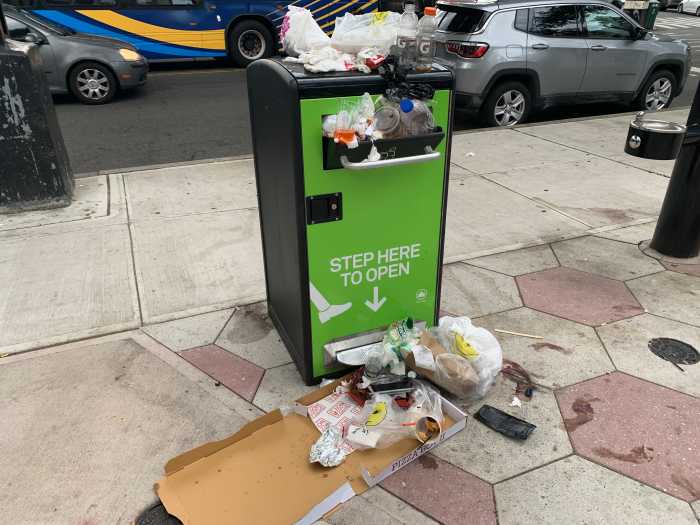Ai Weiwei’s middle-finger protests against iconic symbols of authority have won him wide renown. | SUNDANCE SELECTS
China has become a symbol of dynamic economic growth in the decades since the Tiananmen Square protests were crushed, but its tolerance for social freedom has lagged far behind.
Artist and activist Ai Weiwei may be better known in the US for spending almost three months in jail on trumped-up charges of tax evasion than for his artwork. Alison Klayman, the director of “Ai Weiwei: Never Sorry,” was able to follow him for a three-year period, during which Ai found his voice as a political maverick. She’s far more interested in him as an activist than an artist, though the film touches on both aspects of his life. At times it comes close to hagiography, but Ai’s courage seems to warrant it, even if his flaws — such as fathering a child with one woman while married to another — are all too human.
Ai came to international prominence in 2008 for his work on Beijing’s “bird’s nest” Olympic stadium. Distressed by the way the Chinese government used the Olympics as an excuse to kick poor people out of the city, he denounced the Games. His next major project was memorializing the victims of a 2008 earthquake in Sichuan — many of whom died as a result of poor government construction — by publishing their names and the details of an investigation into the tragedy. Ai compared the buildings’ structural integrity to tofu.
In 2009, while in Sichuan making a documentary, he was awakened by police in the middle of the night and assaulted. The resulting wound required surgery in Germany.
Ai returned to China and his activism on his blog — since banned by the Chinese government — and his Twitter feed. He also designed a show featuring millions of sunflower seeds for a British museum. But in 2011, the Chinese government ordered his studio demolished and arrested him. Upon release, he was banned from giving interviews, but he soon broke that rule. The results of that defiance play over the film’s closing credits.
Ai lived in New York for a dozen years beginning in the early 1980s and seems to have been peripherally involved with the East Village punk scene. Its spirit carried over into some of his work, such as photos of himself in front of various landmarks — including Tiananmen Square, the White House, and the Eiffel Tower — holding up his middle finger. He also photographed ancient vases being smashed and repainted others, one with the Coca-Cola logo. In a Chinese context, these aren’t just snide gestures; they’re comments on the way the Cultural Revolution turned its back on the past. Ai’s work testifies to the way Chinese Communism imposed the norm that the past was something to be ignored at best and destroyed at worst.
As depicted by Klayman, there’s no firm distinction between Ai’s work as an artist and an activist. His documentaries, posted online for free viewing, are an extension of his desire for governmental transparency about the Sichuan earthquake. Holding up his middle finger in Tiananmen Square is an obvious political statement, if a crude one, but the film finds topical meaning regarding the value of individualism even in an artwork consisting of sunflower seeds spread on the floor. He may be the first artist whose Twitter feed is central to his work.
Klayman’s film suffers from a lopsided structure. Around the halfway mark, the narrative suddenly goes back to Ai’s formative New York period, while it compresses the past year of Ai’s life into its final few minutes. Undoubtedly, Klayman had less access to him during that period, as he was in jail for much of that time. Throughout, she uses the device of filming other journalists interviewing Ai. Her own voice is heard on camera several times, but she often lets other people speak for her.
There’s been a boom in Chinese documentaries over the past decade, including such major films as Zhao Liang’s “Crime and Punishment” and “Petition” and Wang Bing’s “West of the Tracks.” Little of this work has been distributed in the US, which is unfortunate since it offers a valuable look at a rapidly evolving society from the inside. As an outsider, Klayman can’t offer the same sort of perspective. “Ai Weiwei: Never Sorry” is tightly focused on Ai, touching only superficially on the larger Chinese art scene and the political context in which he works.
That said, the film is still highly informative. For Americans, there’s something inspiring about an artist using his fame to shine a light on the darker aspects of his nation’s culture, without the egomania that often accompanies celebrity activism.
AI WEIWEI: NEVER SORRY | Directed by Alison Klayman | Sundance Selects | In English and Mandarin with English subtitles | Opens Jul. 27 | IFC Center, 323 Sixth Ave. at W. Third St.; ifccenter.com | Lincoln Plaza Cinema, 1886 Broadway at W. 63rd St.; lincolnplazacinema.com



































